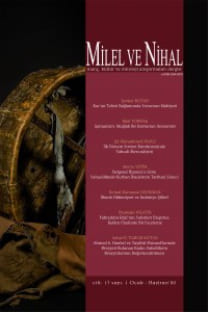Muslims and Christians in the Balkans: Historical Aspect and Contemporary Challenges -Dialogue without Alternative-,
For ten turbulent years, from 1991 to 1999, high intensity armed conflicts, which had devastating effects on the relationship between the inhabitants, broke out in Kosovo. While it is not the purpose of this paper to present a comprehensive overview of the recent history of the Balkans, and Former Yugoslavia in particular, focusing on certain facts and events will enable us to understand the conditions for the formation of new countries after the disintegration of Yugoslavia. Among those language, identity, relations with the other and interreligious dialogue are extremely delicate and political issues. With a reference to interreligious dialogue this paper seeks to present the characteristics of the relations between Muslims and Christians in the Balkans. In this regard, firstly, I will focus on the meaning and significance of dialogue in the Balkans and then deal with Qur’anic approach to the dialogue. After discussing the barriers set against the dialogue in the Balkans, and particularly ideological prejudices among them, I will analyse the possibilities to build collaboration between the Balkan Muslims and Christians in the face of new world challenges.
Anahtar Kelimeler:
Dialogue, Identity, Disintegration, Balkan Peninsula, Love of God, Islamic Faith, Ottoman Influence.
Muslims and Christians in the Balkans: Historical Aspect and Contemporary Challenges -Dialogue without Alternative-
For ten turbulent years, from 1991 to 1999, high intensity armed conflicts, which had devastating effects on the relationship between the inhabitants, broke out in Kosovo. While it is not the purpose of this paper to present a comprehensive overview of the recent history of the Balkans, and Former Yugoslavia in particular, focusing on certain facts and events will enable us to understand the conditions for the formation of new countries after the disintegration of Yugoslavia. Among those language, identity, relations with the other and interreligious dialogue are extremely delicate and political issues. With a reference to interreligious dialogue this paper seeks to present the characteristics of the relations between Muslims and Christians in the Balkans. In this regard, firstly, I will focus on the meaning and significance of dialogue in the Balkans and then deal with Qur’anic approach to the dialogue. After discussing the barriers set against the dialogue in the Balkans, and particularly ideological prejudices among them, I will analyse the possibilities to build collaboration between the Balkan Muslims and Christians in the face of new world challenges.
Keywords:
Dialogue, Identity, Disintegration, Balkan Peninsula, Love of God, Islamic Faith, Ottoman Influence.,
___
- Davud Bessam Adžek, El-Hivaru-l-islamijju-l-mesihi-el-mebadiu, et-tarihu, el- mevduatu, el-ehdaf, Daru kutejbe, Bejrut, 1998.
- İuro Šušnjic, 'The meaning and significance of dialogue' in Religious dialogue in the Balkans: The Drama of Understanding, Vukomanović Milan, Vučinić Marinko, Belgrade open school, Belgrade, 2000.
- Dzemaludin Latic, Muslimani i krscani na Balkanu, u ediciji: Islamski svijet danas, Zagreb: Islamski centar, 1995.
- Mahmoud M., Ayoub ‘’The Qur’an and Religious Pluralism’’ in Islam and Global Dialogue – Religious Pluralism and the Purusit of Peace, ed. Roger Boase, Aldershot: Ashgate, 2005.
- Mustafa Ceric, ‘’The Meaning of religious Education for Peace and Dia- logue in the Balkans’’ in Islamic Textbooks and Curricula in Europe, Ednan Aslan, Frankfurt am Main, Peter Lang, 2011.
- Paul L. Heck, Common ground: Islam, Christianity, and religious pluralism, Washington DC: Georgetown University press, 2009).
- Rasim Muminovic, Filozofija, i ideologije – ideolosko otreznjivanje, Sarajevo, Duh i vrijeme, 2/256.
- Seyyed Hossein Nasr, Srce Islama – trajne vrijednosti za čovječanstvo, Duh i vrijeme, Sarajaevo –El-Kalem, Sarajevo, 2002.
- Tarik Ramadan, Evro-američki muslimani i budućnost islama, trans. from english by Karčić Fikret, Karčić Hamida, Latić Džemaludin and Alibašić Ahmet, Udruženje ilmijje Islamske zajednice u Bosni i Hercegovini, Sarajevo, 2007.
- Zajednicka rijec za nas i vas, Kraljevski institut za islamsku misao Ahl Al- Bayt, Sarajevo: El-Kalem, CNS, 2010.
- ISSN: 1304-5482
- Yayın Aralığı: Yılda 2 Sayı
- Başlangıç: 2003
- Yayıncı: Milel ve Nihal: Eğitim, Kültür ve Düşünce Platformu Derneği
Sayıdaki Diğer Makaleler
Religion and Education in New Millennium Macedonia
Nathalie Clayer, Në fillimet e nacionalizmit shqiptar-Lindja
Makedonya’da Bulgar ve Latin Kilisesinin Gelişimi (Tunalı Hilmi’nin Makedonya Risalesi)
Në fillimet e nacionalizmit shqiptar-Lindja e një kombi me shumicë myslimane në Evrope
